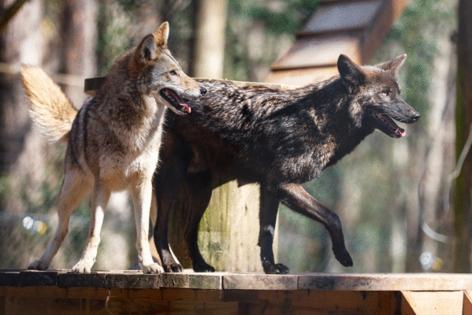Coyotes are all over Georgia. Controlling them might not be worth it
Published in Science & Technology News
ATLANTA — A large, nocturnal predator has become an increasingly common sight in Georgia in recent years, including around metro Atlanta: the coyote.
Now, a new University of Georgia-led study finds coyotes are likely here to stay in the Southeast, and efforts to control populations of the crafty animals are probably a waste of time and money.
“As much as it seems lethal control is going to be a good method, I think we have to abandon that and be creative about how we’re gonna work with coyotes in the future,” said Heather Gaya, postdoctoral researcher at UGA and the study’s lead author.
The study was conducted by researchers from UGA and the U.S. Department of Agriculture. Their findings were published this summer in the scientific journal Ecosphere.
The scientists focused on coyotes living on a forested, 78,000-acre portion of the Savannah River Site. Located just across the border in South Carolina, SRS has been used for decades as a federal testing ground and research laboratory for nuclear weapons, reactors and radioactive waste management.
Coyotes were trapped and killed on the site between 2010 and 2012, part of a separate study of the area’s deer populations. Using information gleaned from the effort, along with howl recordings, scat samples, and baited trap data collected between 2007 and 2024, researchers modeled the coyote population to see how it responded over time.
In short, they found lethal removals knocked back coyote numbers for a few years, but once control efforts ceased, they bounced back fast.
Before 2010, the researchers estimated there were roughly 50 coyotes per 100 square kilometer tract. By the time lethal removals stopped in 2012, coyote densities had fallen to 22 per transect. Just two years later, however, they were back up to 44.
Their numbers have hovered around there ever since, the study found.
Considering the steep monetary and crew costs of removal, the researchers say the findings show large-scale removals are not worthwhile.
“The main finding is that we can’t remove coyotes by lethal control and that it’s foolish and a waste of money to do so,” Gaya said.
Blake Graber, an urban wildlife biologist with the Georgia Department of Natural Resources, said the study largely confirms what was already known: Coyotes are incredibly adaptable.
Coyotes aren’t native to Georgia — the species made its way to the Peach State from the West and Midwest in the 1970s. But in the Southeast, the opportunistic canines have found an ideal environment.
Apex predators like red wolves and cougars were taken off the landscape by humans long ago, leaving coyotes with no natural threats and little competition. As omnivores, the animals will eat anything from fruit to vegetables to crickets, along with prey as large as small deer and, tragically, the occasional house pet.
Their flexible social groupings help them survive, too. Instead of staying in packs their whole lives, coyotes are willing to “disperse” and move large distances to find new habitats and mates.
“They’re able to just say, ‘Yeah, I don’t like this anymore. I’m going to change my behavior,’” Gaya said. “And that makes them very different than a lot of the predator communities we had before.”
On private property in Georgia, coyotes can be killed year-round with few restrictions with a hunting license. On public lands, hunting is more restricted.
Georgia doesn’t have any concerted coyote control efforts underway, Graber said, but removals are sometimes conducted by homeowners associations and other groups.
Over the years, some worried coyotes could harm native wildlife. Though the canines can be a nuisance to pets and livestock, the broad ecological harms some feared haven’t materialized, Gaya and Graber said. If anything, coyotes help keep rodents and other pests in check.
Graber acknowledged coyotes can be frightening to residents, especially ones in urban areas less accustomed to encountering large predators. But based on these findings and other research, he said the best course of action is for humans to learn to live with the animals.
“I think the fear of coyotes is disproportionate to what the threat actually is,” Graber said.
_____
©2025 The Atlanta Journal-Constitution. Visit at ajc.com. Distributed by Tribune Content Agency, LLC.







Comments